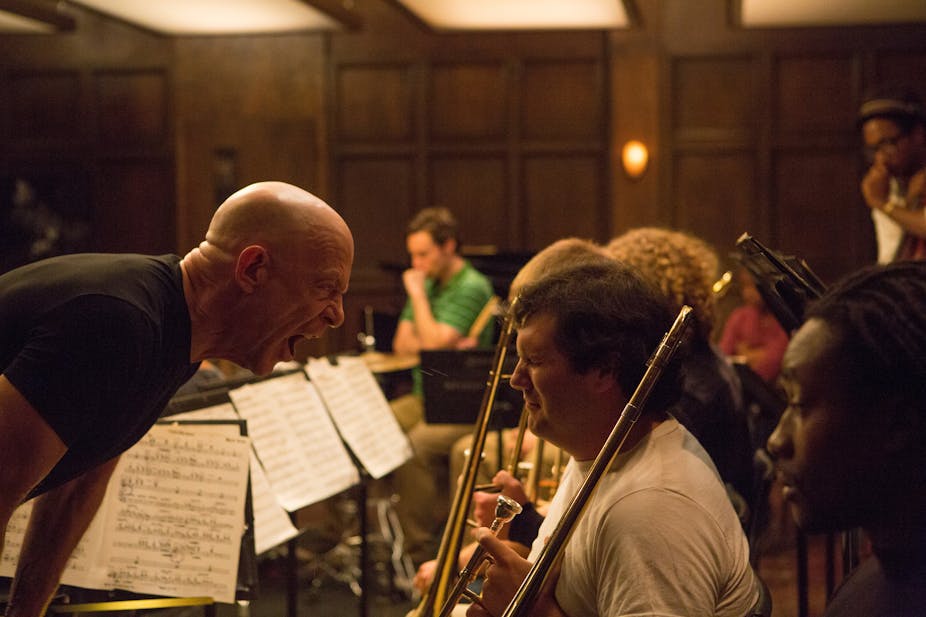Philip Pickett, a very prominent conductor in the early music world, has been jailed for 11 years for sexually attacking two pupils and a young woman. He carried out the assaults in sound-proofed practise rooms in the 1970s and 1980s.
Abuse in music education is an issue that also currently features in a very different sphere – the Oscars race. Whiplash, nominated for Best Picture at this year’s awards, is is set in the fictional New York Schaffer Conservatory, the setting of which is undoubtedly based upon the Juilliard School (and where the classroom scene is shot). We follow a student jazz drummer, Andrew Neiman, as he is driven to the edge by tyrannical teacher Terence Fletcher.
Despite relying on two-dimensional characterisation and implausible scenarios, the film makes some very pertinent points about bullying and the pervasive power games that conservatoires promote.
Recent cases
Abuse of students by teachers is a real problem in music education. The Venezuelan massive music education project El Sistema, once hailed as a social program, has since been described as “a model of tyranny”. In March 2013 Michael Brewer, a former music teacher at Chetham’s school of music was jailed for 6 years after abusing a student who took her own life during the trial; a further teacher at the school (my own conducting teacher there) was jailed for 8 months in September 2014 after admitting to sexually assaulting a student when she was a child.
Various other cases involving teachers from the school await trial at the time of writing. A series of women have come forward to attest to their abuse at the hands of former Director of Music at the Yehudi Menuhin School, the late Marcel Gazelle, while many men came forward too with horrifying stories about the late Alan Doggett, the major conductor for Andrew Lloyd Webber and Tim Rice and former music director at Colet Court School, following investigations by myself and The Times.
I have been involved in as a campaigner and researcher on the subject of abuse in music education for several years. I have chronicled many cases coming to light both before and after the Michael Brewer trial. I am aware of many other allegations, sometimes against very prominent musicians, throughout UK music education but also in the US, France, Belgium, Germany, Austria, Russia and elsewhere.
What I have seen, overwhelmingly, from having gone through an elite musical training, working as a professional musician, and also from a large amount of information disclosed privately to me, is a systematic pattern of domination, cruelty, dehumanisation, bullying and emotional manipulation from unscrupulous musicians in positions of unchecked power, of which sexual abuse is one of several manifestations.
Pure fiction?
Compare Whiplash. Terence Fletcher is very much a cartoon villain. He physically assaults and publicly humiliates his students, and fires off homophobic and anti-semitic insults like an unintentional parody of Joe Pesci in a Martin Scorsese film, or anything scripted by David Mamet.
All of which he justifies (at least outwardly) by the old lie that he is pushing students to get the best results. Any individual acting in such a blatant manner in a US or UK conservatory today would almost certainly face severe disciplinary action very quickly (in Russia or China it might be a different matter).
Few could deny that Fletcher is a vicious bully. The fact that he is a jazz rather than classical teacher, and as such less bound by conventions of bourgeois respectability, may make him superficially more plausible, but I have found that bullying musicians are often more subtle and insidious.
A more devastatingly incisive rendition – the most realistic rendition of the culture of the conservatory I have yet seen on film – is Isabelle Huppert’s portrayal of the monstrous Erika in The Piano Teacher. Erika is a bitter and twisted woman utterly unfit for teaching. She uses the language and rhetoric of musical discernment and sophistication to undermine the confidence and sense of self of those she resents and envies.
Despite being somewhat caricature-like, the nature of Fletcher’s power is portrayed with insight. Although his methods might be exaggerated, such abuse of power does regularly occur and the film should not be dismissed as entirely fictional.
Classical conservatoires
It is important to note that the conservatory environment portrayed here belongs historically to classical musicians. While jazz has occasionally been taught in such institutions ever since the first course in Frankfurt in 1928, it has remained marginal until quite recently. Juilliard, for example, first offered jazz courses in 2001 and few big names in jazz – such as Charlie Parker or Buddy Rich, both mentioned in the film – had this type of musical education.
Conservatories are still strongly weighted towards classical music, and a large amount of bullying is found in this field, though it is often less obvious than that of Fletcher. Fewer volleying barrages of insults. Instead, I have found that frequently students’ inferiority is insinuated through assertions about their perceived emotional maturity or even level of sexual prowess, on the basis of their playing.
Some use personality stereotypes, based on just a few tawdry attributes, to demean and humiliate the student and flaunt their own power. In earlier times these might be overtly based upon the student’s ethnicity or social background; the difference now is simply that this is implicit rather than clearly stated.
Whiplash’s Fletcher knows just how vulnerable and desperate fledgling musicians are. He exploits this situation. Relationships, friendships or other trappings of a normal life disappear under the weight of naked ambition; other humans matter only to the extent they can further one’s career. The pressure to act in such a manner is very real in advanced musical education.

Those who lose out
The rather hollow “victory” achieved at the end of the film by Neiman (in a tour de force of filming as well as playing) could be argued to have legitimised Fletcher’s treatment of him. But the lasting message is not optimistic.
We find out that a former student, Sean Casey, likely hanged himself in response to his treatment by Fletcher. This is far more striking than some of the other implausible and melodramatic plot devices. But Casey was successful, at least in the terms set out here, having found a place playing in Marsalis’s museum-piece concerts.
More important, and ignored in most portrayals of musical education, is the fate of those who do not find success. These people have sacrificed everything else in their lives. Institutions teach significantly more students than could ever find available work. And so alongside the rosters of starry names brandished in conservatories’ publicity material, their legacy is equally to be found in the other alumni who are left bereft and disillusioned.
I know of many cases, some involving those I knew at school or college, in which the legacy of such study has been chronic depression, difficulties with relationships, drink and drug abuse. This is often prompted by the terror and paranoia engendered by repeated psychological, physical or sexual abuse, as well as the cripplingly low self-esteem that can result.
For those of us lucky few who have been able to devote our professional lives to music, many factors beyond supposed talent or natural selection are involved, often beyond one’s personal control.
This throws light on the real inadequacies of both the teachers and the institutional culture. Better results, both personal and musical, could be achieved by a teaching culture founded upon co-operation and mutual support rather than aggressive competition. The learning needs of students must be prioritised above the reputations of teachers. Educational breadth is needed to enable students to flourish as whole people, not just performing machines.
But this will only happen when the musical professions take real steps to reform a brutalising and dehumanising range of practices and attitudes, the justifications for which are no more convincing than those of Fletcher.
At the star-studded Academy Awards, remember that the essence of what is portrayed in Whiplash is very real and has profound effects upon many young musicians.

